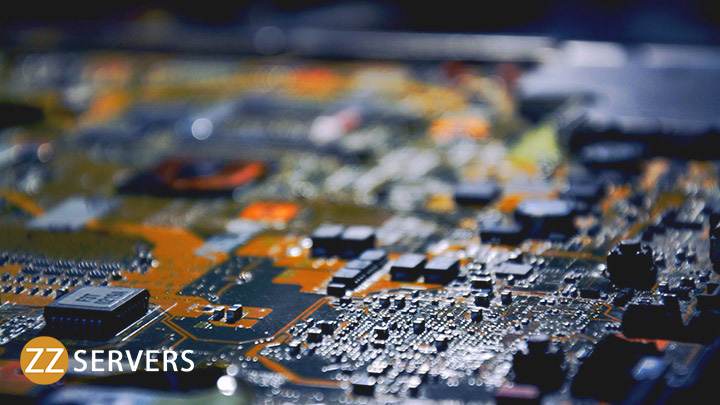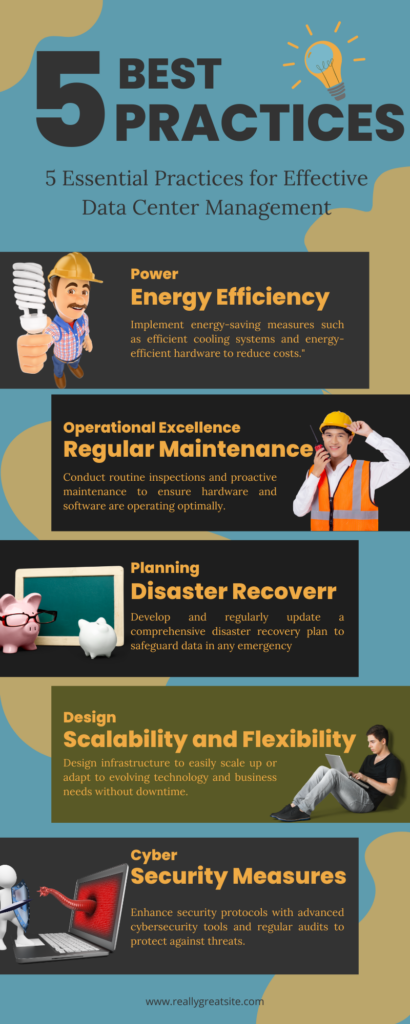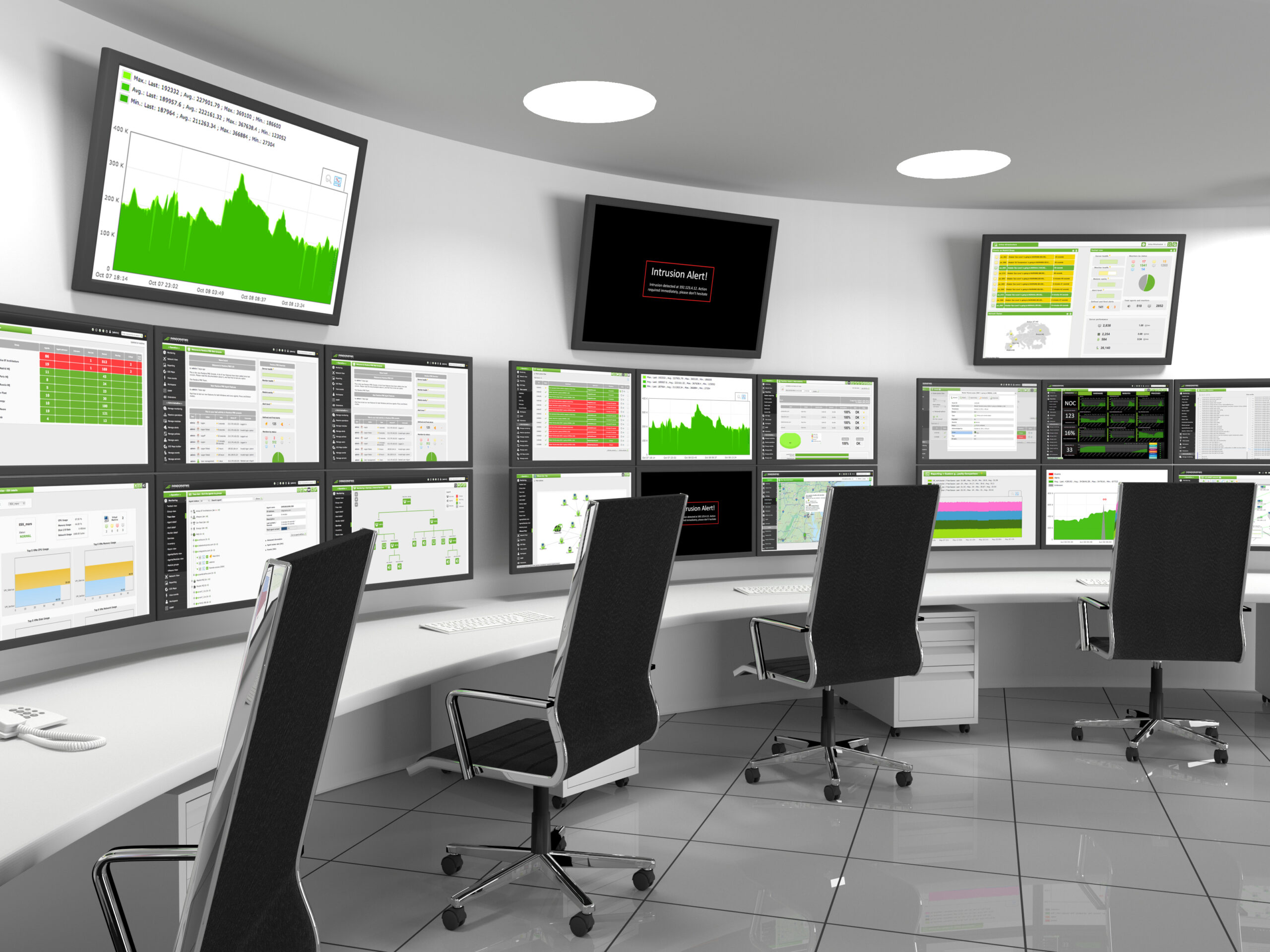Data center management oversees all operations of an organization’s critical data center IT infrastructure. This includes key responsibilities like capacity planning, procurement and maintenance of systems, security compliance, incident resolution, and efficiency initiatives.
Key functionalities involve monitoring systems, effective capacity planning, and change control systems. Proper management helps to adhere to Service-Level Agreements, ensuring uptime, availability, and meeting performance goals.
Excellent management skills and suitable software are essential for successful data center operations. This is no small feat and demands your attention. Make it a priority to master the complexities of data center management.
You’ll discover more intricate aspects of this critical service as you explore further.
What is Data Center Management?
Data Center Management involves operating and managing complex facilities that house hardware, software, services, and physical infrastructure. It’s a vast field that requires careful oversight of many components, including the nitty-gritty elements like power management and cooling systems, which are critical for maintaining peak operations within a data center.
Software for data center management plays a huge role, too. Software is necessary when it comes to data center infrastructure management (DCIM). It aids in monitoring and managing the data center’s performance and capacity, ensuring that we’re utilizing resources efficiently.
And speaking of capacity, it’s an important aspect of data center management. It’s all about predicting our future needs and ensuring that our infrastructure can handle it. We can’t afford to underestimate capacity. Doing so could lead to major issues down the line.
Lastly, let’s not forget about services and human IT staff. They’re on the front lines, keeping a watchful eye on our hardware and software. They’re crucial to the success of any data center’s management strategy. Without them, we’re flying blind.
What are Some Data Center Management Challenges?
A few challenges consistently stand out as we navigate the complexities of data center management.
We’re often confronted with issues like capacity management, service-level agreements, and change management, all while preparing for potential disaster recovery and maintaining real-time reporting.
These obstacles require our full attention and strategic solutions to keep our data centers running efficiently.
Capacity Management
One of the significant challenges we face in data center management is capacity management, specifically planning for current and future resource needs. Balancing resource utilization is vital to ensuring we’re making the most of our infrastructure without overloading it.
We’re also managing diverse data centers, each with different maturity levels. This diversity poses a hurdle in maintaining SLA compliance across the board. Real-time reporting and monitoring are our lifelines in this complex task. They provide us with a clear snapshot of our capacity, helping us anticipate future demands and adjust accordingly.
Essentially, effective capacity management forms the backbone of data center management, a pivotal piece in the puzzle of staying ahead in today’s data-driven world.
Service-level Agreements
Service-level agreements (SLAs) present a significant challenge in data center management. These SLAs, guaranteeing uptime, performance, and availability, are critical to customer satisfaction and business success.
We often grapple with the balance between meeting SLA requirements and maintaining cost-efficiency while optimizing resources. Non-compliance with SLAs can lead to financial penalties, damage to our reputation, and loss of customer trust.
So, we implement effective monitoring, detailed capacity planning, and proactive maintenance to guarantee adherence to these agreements. We’re constantly vigilant, as one misstep could seriously impact our operations.
Change Management
While we’re on top of our SLAs, another challenging aspect of data center management is change management. This involves juggling updates, modifications, and upgrades to our IT infrastructure. Maintaining system stability during these alterations is a tough task. We’re also under pressure to keep downtime to a minimum, ensuring a seamless shift for all stakeholders.
There’s also the regulatory compliance issue, which must never be overlooked. Each change has to be meticulously documented and conducted in adherence to stringent standards. Change management certainly presents its own set of hurdles. However, we can confidently navigate these changes through careful planning, robust testing, and clear communication and enhance our overall operational efficiency.
Disaster Recovery
Another key challenge in data center management is disaster recovery, specifically the need to guarantee timely data backup and restoration processes.
- High availability and reduced downtime are essential to guarantee business continuity.
- The robustness of backup systems and recovery procedures directly impact the efficiency of disaster recovery.
- Regular testing of these systems is vital to validate their effectiveness.
- The implementation of redundant systems provides a safety net in the face of potential disasters.
If we don’t address these challenges head-on, we risk not only the loss of valuable data but also significant disruption to our operations. Hence, a sound disaster recovery strategy is pivotal for successful data center management.
Real-time Reporting
We often face the challenge of real-time reporting. Significant hurdles are ensuring data accuracy and maintaining data integrity amid high data volumes.
Yet, the benefits are worth the struggle. With real-time reporting, we can detect anomalies swiftly, enabling us to allocate resources efficiently. It also allows us to identify potential issues proactively, giving us the upper hand in preventing downtime. Additionally, real-time reporting is essential in meeting SLA requirements, as it provides the precise data needed to track our performance.
Despite its challenges, mastering real-time reporting transforms our ability to manage data centers effectively.
Physical Security
Another notable hurdle we face when managing data centers is ensuring physical security. This is a complex task laden with various challenges.
- Uninterrupted operations demand robust **access control systems that involve sophisticated biometric authentication.
- We must also install surveillance cameras for continuous monitoring to deter potential threats.
- Adherence to industry regulations is critical, and staying compliant can be tough.
- Environmental factors, including temperature and humidity, need constant scrutiny to prevent damage to our data center’s infrastructure.
In essence, physical security isn’t just about keeping the intruders out; it’s about creating a safe, regulated, and compliant environment that guarantees our data center’s seamless function.
Power Management
Power management also presents significant challenges in data center management. Balancing power usage across hardware and cooling systems can be tricky, but it’s essential for energy efficiency.
Poor power management can drive up operating costs and undermine our efforts to maintain a stable, efficient data center. Real-time monitoring helps us spot inefficiencies in power usage, allowing us to correct them promptly.

Data Center Management Strategies and Tasks
Let’s discuss the typical tasks in data center management.
These tasks include:
- Server maintenance routines
- Energy efficiency strategies
- Security protocol implementation
- Network connectivity monitoring
- Hardware installation procedures
It’s important for us to understand these tasks to guarantee the smooth operation of our data centers.
Server Maintenance Routines
Regular server maintenance routines are integral tasks involving hardware and software upgrades to enhance performance and security. It’s not just about keeping the servers running; it’s about staying ahead of the curve.
We focus on:
- Regular hardware and software upgrades for peak performance and security.
- Efficient data distribution and storage strategies as part of server maintenance.
- Reliable backup processes to prevent data loss and ensure business continuity.
- Proactive emergency planning for situations like power outages or hardware failures.
We also provide prompt technical support to address and resolve operational challenges swiftly. This thorough approach to server maintenance ensures that data centers are always up to the task.
Energy Efficiency Strategies
As we examine our energy efficiency strategies, it’s important to note that these strategies in data center management can greatly reduce costs and environmental impact. By optimizing cooling systems, we can manage power usage and boost hardware efficiency. These steps not only curb operational expenses but also promote sustainability.
- Optimized Cooling Systems
- Description: Implement advanced solutions like liquid or in-row cooling to target hot spots and reduce energy consumption.
- Impact: Efficient cooling can significantly reduce the energy used to maintain optimal equipment temperatures.
- Hot and Cold Aisle Containment
- Description: Organize server racks in a hot aisle/cold aisle layout to minimize mixing of hot and cold air, improving cooling efficiency.
- Impact: This layout enhances the effectiveness of cooling systems, reducing the energy needed to maintain temperatures.
- Energy-Efficient Hardware
- Description: Invest in servers and hardware that are specifically designed to be energy-efficient, utilizing advanced power management technologies.
- Impact: Such hardware reduces the overall energy draw of the data center, lowering operational costs.
- Server Virtualization
- Description: Use virtualization technologies to run multiple virtual servers on a single physical server, maximizing the utilization of available resources.
- Impact: Reduces the number of physical servers needed, decreasing both energy consumption and space requirements.
- Power Usage Effectiveness (PUE) Monitoring
- Description: Regularly monitor and aim to improve the Power Usage Effectiveness ratio, which measures the efficiency of a data center’s power usage.
- Impact: A lower PUE indicates more efficient use of energy, where more power is used by computing equipment rather than cooling and other overhead.
- Renewable Energy Sources
- Description: Incorporate renewable energy sources, such as solar or wind power, to supplement or replace traditional energy sources.
- Impact: Reduces reliance on non-renewable power, decreasing the carbon footprint and potentially lowering energy costs.
Adopting energy efficiency strategies in data center management is a win-win situation. We achieve high performance while minimizing our environmental footprint. It’s about time we prioritize such strategies for a sustainable, cost-effective future.
Security Protocol Implementation
Shifting our focus to security protocol implementation, we see that tasks like setting up firewalls, intrusion detection systems, and access control mechanisms are essential in data center management. Additionally, using data center management software is indispensable in successfully implementing these security protocols.
Our tasks typically involve:
- Performing regular security audits and vulnerability assessments
- Implementing robust incident response procedures
- Monitoring network traffic to identify possible cyber threats
- Enforcing stringent access control mechanisms
We emphasize these activities. They’re vital in mitigating cyber threats and ensuring the security of our data centers. By rigorously adhering to these procedures, we can respond effectively to any potential breach, thereby maintaining a secure data environment.
Network Connectivity Monitoring
We consistently work towards maintaining the integrity of the data center’s operations by actively monitoring network performance, availability, and reliability as part of our network connectivity monitoring tasks in data center management. We gain real-time insights into network health by utilizing center infrastructure management (DCIM) and advanced network monitoring tools. This proactive monitoring helps us promptly identify and resolve potential issues, optimize network resources, and prevent costly downtime.
It’s not just about maintaining connectivity; it’s about ensuring the network’s peak performance and securing seamless communication between devices. Through this rigorous oversight, we aim to uphold the integrity of the data center’s operations.
Hardware Installation Procedures
Just as we guarantee the peak health of our network, another significant task in data center management is implementing appropriate hardware installation procedures. This involves:
- Setting up infrastructure components like servers and storage devices.
- Carefully rack mounting these devices, following safety protocols to guarantee a secure and efficient data center.
- Documenting every hardware installation aid in organizing inventory and tracking any changes.
- Regular testing and maintenance, ensuring everything runs smoothly.
These steps are vital in data center management. They ensure that the hardware installation process is systematic and standardized. This not only boosts the efficiency of the data center but also helps mitigate potential risks, enhancing the overall reliability of our services.
Software Update Scheduling
Another critical task in data center management is scheduling software updates. This process involves the planned and timely implementation of updates for operating systems, applications, and other software components. By regularly scheduling these updates, we guarantee that security patches, bug fixes, and feature enhancements are efficiently deployed in data center environments. By doing so, we uphold system stability and security and adapt to evolving technologies by updating our applications.
To minimize user impact and reduce downtime, we schedule these updates during maintenance windows or off-peak hours. Automated tools help us streamline the software update scheduling process, ensuring timely and consistent deployment across multiple servers and systems.
Data Backup Systems
When managing a data center, you can’t overlook the significance of data backup systems, which are essential for ensuring data integrity and availability. A well-devised backup system is critical to the broader management of data centers.
- It involves creating redundant copies of data, ensuring no loss of critical information.
- The backup planning falls under the data center manager’s duties, setting up schedules and storage locations.
- These backup systems become the lifeline in disaster recovery, reinstating data following system failures.
- Lastly, the importance of regular testing of backup systems can’t be emphasized enough to validate their effectiveness.
Disaster Recovery Planning
As part of our data center management duties, we emphasize disaster recovery planning, a strategic process designed to guarantee business continuity in the face of unexpected system failures or disasters.
We’re tasked with developing sound backup processes and robust recovery plans, as well as implementing failover systems. Key to this process is determining recovery time objectives (RTO) and recovery point objectives (RPO), which help us anticipate and minimize potential downtime.
Additionally, we establish redundant systems, ensuring that even in the event of a disaster, our operations can continue unhindered. It’s a complex task, but one we’re committed to, because it’s not just about managing data, it’s about securing your business’s future.
How does DCIM Software Improve Data Center Management?
In exploring data center management, we can’t ignore the role of Data Center Infrastructure Management (DCIM) software.
These powerful data center management tools greatly enhance operational efficiency, provide real-time monitoring capabilities, and optimize asset management.
Let’s look at how DCIM software becomes a game-changer in managing data centers effectively.
Enhancing Operational Efficiency
To enhance operational efficiency in data center management, we turn to DCIM software. This essential tool provides real-time visibility into IT equipment and assets for thorough monitoring and control. This software greatly boosts operational efficiency by aligning IT infrastructure with business needs, ensuring maximum uptime and cost efficiency.
Here’s how DCIM software refines data center management:
- It offers asset management by providing a complete IT equipment inventory, helping us track and manage assets efficiently.
- It aids in capacity planning, ensuring we utilize our resources efficiently.
- It targets energy optimization, helping us cut down on unnecessary energy consumption.
- It streamlines incident management, promptly addressing issues or failures to minimize downtime.
Real-Time Monitoring Capabilities
Harnessing the power of DCIM software, we can greatly enhance our data center management through its real-time monitoring capabilities. This software provides a holistic view of all data center assets, allowing us to anticipate and address issues before they escalate. Its predictive capabilities reduce downtime and increase operational effectiveness.
We can optimize energy use, swiftly handle incidents, and execute effective capacity planning with real-time monitoring. We’re not just guaranteeing uptime but proactively managing our data center, guaranteeing consistent uptime and cost efficiency.
Asset Management Optimization
With the aid of DCIM software, we’re not only monitoring our data center assets in real time but also optimizing their management for superior operational performance.
DCIM tools enable effective asset management, facilitating energy optimization, capacity planning, and empowering predictive maintenance strategies. This is crucial in ensuring our data center’s power efficiency and cooling optimization.
Here’s what we’re gaining with these tools:
- Enhanced visibility of all assets and their performance.
- Predictive maintenance capabilities, minimizing downtime.
- Optimization of energy usage, leading to significant cost savings.
- Improved capacity planning, ensuring we’re future-ready.
In essence, through DCIM software, we’re transforming our data center management approach, shifting from a reactive to a proactive stance.
Cloud and its impact on data center management
The rise of cloud technology has dramatically reshaped data center management, pushing us towards hybrid and multi-cloud environments. We’re now challenged to manage both on-premises data and resources in public or private clouds. This shift has transformed how we approach data center operations, requiring new management tools and strategies.
Cloud providers offer a plethora of services, from storage and computing to advanced analytics and machine learning capabilities. But managing data across these diverse platforms isn’t as simple as it might seem. We need to guarantee seamless connectivity and data transfer, maintain rigorous security standards, and optimize power consumption.
But it’s not all uphill. Cloud technologies can also enhance our data center operations. For instance, they allow us to scale resources up and down as needed, improving cost efficiency and agility. We can also leverage cloud-based tools for monitoring and managing our infrastructure, simplifying many routine tasks.
In essence, the cloud’s impact on data center management is a double-edged sword. It brings new challenges but also opens up exciting opportunities for improving efficiency and agility. We must adapt and evolve to make the most of these changes.
Best Practices for Data Center Management
Effective data center management requires a thorough understanding of the organization’s needs and goals. To ensure smooth operations and maximize efficiency, here are four best practices for data center management:

The Future of Data Center Management
The future of data center management will continue to be dynamic and exciting. We’re seeing a shift toward hybrid data centers combining the best public and private clouds. This blend offers flexibility and control, providing a robust solution for today’s complex IT environments.
Remote management, too, is on the rise. With the help of AI, we can optimize the operation of data centers from anywhere in the world. Advanced systems known as AIOps can even automate many of these operations, boosting efficiency and reducing error.
Significant changes are also coming about in how we manage our assets. The future of data center management is moving toward:
- Hybrid data centers that balance flexibility and control
- Remote management powered by AI for optimized operations
- AIOps for automated operations and increased efficiency
- Single-tool management for a streamlined approach to asset oversight
These developments and a continuous influx of new technologies are focused on optimizing operations. They promise an exciting future of data center management that’s adaptable, efficient, and powerfully effective.

Conclusion
In today’s world, the role of data center management is like a detective’s pursuit of truth in a web of mystery and challenge. Much like the relentless detective, it’s a task that demands meticulous attention, steadfast resolve, and a toolkit of strategies as intricate as the challenges faced. One such tool is DCIM software, the proverbial magnifying glass that allows us to scrutinize and overcome these challenges. However, as the cloud continues to reshape the mystery, the detective must adapt, just as we must in managing data centers.
Enter ZZ Servers, the Chesapeake, Virginia-based Sherlock Holmes of IT Management and Cybersecurity services. With over 17 years of experience in the field and a tight-knit team of dedicated employees, they specialize in solving the mysteries of the digital world for organizations with 20-200 employees. These organizations value predictable results, trust, and accountability, the principles guiding ZZ Servers’ work. ZZ Servers offers various services beyond our data center management services, from Endpoint Security to Incident Response Planning, 24/7 support, and remote assistance.
So, don’t delay. If you’re caught up in the mystery of data center management, contact ZZ Servers today. We’re ready to bring their investigative expertise to your case, ensuring your business remains secure in an ever-evolving digital landscape. Remember, every detective story is a race against time. Make sure you’re on the winning side.
Frequently Asked Questions
What Are the Primary Roles and Responsibilities of a Data Center Manager?
A Data Center Manager oversees the operations of a data center, which houses important computer systems and data storage solutions. Their main roles include:
System Maintenance involves ensuring that all the hardware and software in the data center run smoothly and are regularly updated or replaced.
Security: Implementing strong security measures to protect data from unauthorized access and cyber threats.
Disaster Recovery: Preparing and updating plans to recover data and restore operations in emergencies like power failures or natural disasters.
Supervise: Manage the data center staff, including hiring, training, and overseeing daily activities.
Budget Management: Keeping track of the data center’s budget, expenses, and potential cost-saving opportunities.
Compliance: Ensuring the data center complies with relevant laws and regulations regarding data security and privacy.
These responsibilities ensure that the data center operates efficiently and securely, effectively supporting the organization’s needs.
What Are Some Common Challenges Faced in Data Center Management?
Navigating complexity, meeting SLAs, tracking warranties, costs, monitoring, limited resources, and sustainability are common challenges in data center management. Solutions include DCIM software, colocation data centers, and hardware solutions.
Are any Certifications or education programs available to professionals in data center management?
Yes, several certifications and educational programs are available for professionals in data center management. These programs enhance knowledge and skills in areas like IT infrastructure, networking, security, and system management. Popular certifications include:
Certified Data Centre Management Professional (CDCMP) – This certification focuses on the day-to-day management of data centers, including operations, capacity management, and auditing.
Data Center Infrastructure Expert (DCIE)—This certification, Aimed at senior professionals, covers advanced topics in data center design and operations.
VMware Certified Professional – Data Center Virtualization (VCP-DCV) – This certification is ideal for professionals working with VMware vSphere environments, focusing on installing, managing, and configuring.
Educational programs are also offered by various universities and online platforms, providing both degree and non-degree options in fields related to data center management. These programs can be a great way to deepen expertise and advance a career in this field.



